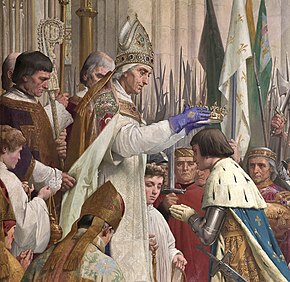
A coronation is the act of placement or bestowal of a crown upon a monarch's head. The term also generally refers to the ceremony which marks the formal investiture of a monarch with regal power. In addition to the crowning, this ceremony may include the presentation of other items of regalia, and other rituals such as the taking of special vows by the new monarch, the investing and presentation of regalia to them, and acts of homage by the new monarch's subjects. In certain Christian denominations, such as Lutheranism and Anglicanism, coronation is a religious rite.[1][2] As such, Western-style coronations have often included anointing the monarch with holy oil, or chrism as it is often called; the anointing ritual's religious significance follows examples found in the Bible. The monarch's consort may also be crowned, either simultaneously with the monarch or as a separate event.
Once a vital ritual among the world's monarchies, coronations have changed over time for a variety of socio-political and religious reasons; most modern monarchies have dispensed with them altogether, preferring simpler ceremonies to mark a monarch's accession to the throne. In the past, concepts of royalty, coronation and deity were often closely linked. In some ancient cultures, rulers were considered to be divine or partially divine: the Egyptian pharaoh was believed to be the son of Ra, the sun god, while in Japan, the emperor was believed to be a descendant of Amaterasu, the sun goddess. Rome promulgated the practice of emperor worship; in medieval Europe, monarchs claimed to have a divine right to rule (analogous to the Mandate of Heaven in dynastic China). Coronations were once a direct visual expression of these alleged connections, but recent centuries have seen the lessening of such beliefs. The most recent coronation in the world was that of King Charles III and Queen Camilla in London in 2023.
Coronations are still observed in the United Kingdom, Tonga, and several Asian and African countries. In Europe, most monarchs are required to take a simple oath in the presence of the country's legislature. Besides a coronation, a monarch's accession may be marked in many ways: some nations may retain a religious dimension to their accession rituals, while others have adopted simpler inauguration ceremonies, or even no ceremony at all. Some cultures use bathing or cleansing rites, the drinking of a sacred beverage, or other religious practices to achieve a comparable effect. Such acts symbolise the granting of divine favour to the monarch within the relevant spiritual-religious paradigm of the country.
"Coronation" in common parlance today may also, in a broader sense, refer to any formal ceremony in relation to the accession of a monarch, whether or not an actual crown is bestowed, such ceremonies may otherwise be referred to as investitures, inaugurations, or enthronements. The monarch's accession usually precedes the coronation ceremony. For example, the Coronation of Charles III took place in May 2023, several months after his accession to the throne on the death of his mother Elizabeth II.
In politics, the expression "coronation" is nowadays often used to refer to the election of a new party leader "by acclaim", without any vote being organised to elect him or her.

- ^ The Lutheran Standard, Volume 7. Augsburg Publishing House. 1967. p. 1967.
- ^ Lockwood, Frank E. (6 May 2023). "Coronation a religious rite for Anglicans". Arkansas Democrat-Gazette. Retrieved 7 May 2023.